This month, I’ve been listening to you, the reader, and going through a backlog of recommendations. There are reviews of: “4 Months, 3 Weeks and 2 Days”, “The Artist”, “Bellflower”, “The Brothers Solomon”, “The Cove”, “Cowboy Bebop”, “Dead Poets Society”, “Die Hard”, “Family Stone”, “Fatal Attraction”, “Funny Ha Ha”, “Hannah Takes the Stairs”, “Lola”, “Moneyball”, “My Sassy Girl”, “Tampopo”, “Tinker Tailor Soldier Spy” and “We Need to Talk About Kevin”.
What doesn’t call you, makes you a stranger. The average rating is 5.61/10, with film of the month being Tampopo.
4 Months, 3 Weeks and 2 Days (2007) – 7.5/10
Original title: 4 luni, 3 săptămâni şi 2 zile
Director/Writer: Cristian Mungiu
Starring: Ali Carauleanu, Luninita Gheorghiu, Madalina Ghitescu
“I can do it only once. What else did you expect?”
 This absorbing Romanian drama follows two students attempting to organise an illegal abortion in 1987 when Romania is still under a Communist regime. The minimalist shots take in the murky surroundings, but build upon the vulnerability of the leads – two lonely friends, full of terror and regret, trying to get to the next day without a hitch.
This absorbing Romanian drama follows two students attempting to organise an illegal abortion in 1987 when Romania is still under a Communist regime. The minimalist shots take in the murky surroundings, but build upon the vulnerability of the leads – two lonely friends, full of terror and regret, trying to get to the next day without a hitch.
The film is painful and brutal, and it’s a slow thriller that takes its time – the pacing lets the drama sink even further. It’s important to know that this really isn’t a fun film – while Dirty Pretty Things made a story about organ transplants fairly watchable and heartwarming, there are no love stories here. Instead, you have long corridors with few exits, and a restless fear behind your shoulder. But it’s gripping, with dialogue so tense that you can’t look away, although that’s probably because you’re watching it with subtitles.
The Artist (2011) – 7.5/10
Director/Writer: Michel Hazanavicius
Starring: Jean Dujardin, Bérénice Bejo
“No, I’m nothing but a shadow. No good for anything but silence.”
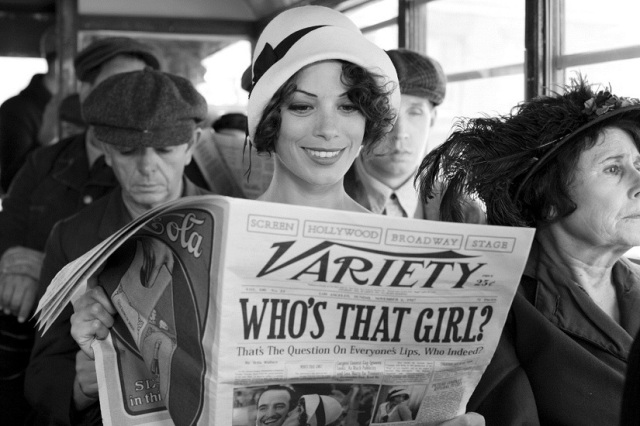 It’s a black-and-white silent film and everyone’s talking about it. It’s a gimmick, but done to satisfy mainstream audiences; the orchestral soundtrack means there’s hardly any genuine silence, and a moment rarely passes without a visual gag. It may be about the decline of silent cinema as it sinks in quicksand, but it’s also an old-fashioned love story – a love story regularly overshadowed by a well-trained dog. So, in a way, it’s Sunset Boulevard with more laughs, a funny dog and less dialogue.
It’s a black-and-white silent film and everyone’s talking about it. It’s a gimmick, but done to satisfy mainstream audiences; the orchestral soundtrack means there’s hardly any genuine silence, and a moment rarely passes without a visual gag. It may be about the decline of silent cinema as it sinks in quicksand, but it’s also an old-fashioned love story – a love story regularly overshadowed by a well-trained dog. So, in a way, it’s Sunset Boulevard with more laughs, a funny dog and less dialogue.
The laughs come thick and fast for most of The Artist, but not so much in the middle – the momentary drag suggests there isn’t actually much to the film beyond the surface other than light entertainment. Still, it doesn’t matter, as it’s often hilarious and visually exhilarating, especially in the opening scene when you see an audience clap, but hear nothing in response.
The director’s playfulness keeps you interested. In a standout scene, a silent film actor has a nightmare that objects make sounds, but his voice is muted – the glass clinks on the table, a landing feather creates a cacophony, but his screams can’t be heard. I had that nightmare once – you get used to it eventually.
Bellflower (2011) – 4.5/10
Director/Writer: Evan Glodell
Starring: Evan Glodell, Jessie Wiseman, Tyler Dawson, Rebekah Brandes
“Dude, I cannot believe you ate grasshoppers to pick up a girl.”
 Even Glodell’s debut is a visually thrilling take on an apocalyptic love story. Its idiosyncratic look is down to the director creatively exploring what the lens can do, as well as using a camera he made himself – literally no other film can look like it. So what went wrong?
Even Glodell’s debut is a visually thrilling take on an apocalyptic love story. Its idiosyncratic look is down to the director creatively exploring what the lens can do, as well as using a camera he made himself – literally no other film can look like it. So what went wrong?
It’s about two friends who spend their days playing about with flamethrowers (again, made by the director himself) until one of them falls in love. The minimalist storyline wouldn’t be a problem if the actors weren’t so wooden and unconvincing. The beauty of the film’s aesthetic is burst by its unhealthy need for confrontation; after five minutes, there’s a cricket-eating scene, and it slowly turns into an uneasy narrative of violent misogyny and boredom.
The Brothers Solomon (2007) – 3/10
Director: Bob Odenkirk
Writer: Will Forte
Starring: Will Arnett, Will Forte, Kristen Wiig, Malin Akerman
“I don’t mean to be rude, but I just bought your groceries.”
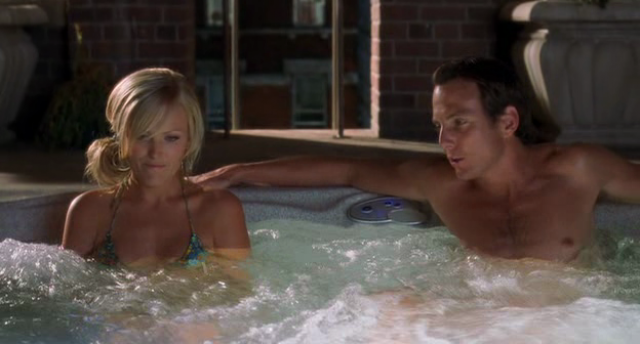 Firstly, it’s terrible. Just terrible. It was such a critical and financial disaster that Bob Odenkirk hasn’t been able to direct a film since. It stars Will Arnett and Will Forte as two incompetent brothers; too often their comical ineptness descends into gross stupidity and, even worse, lazy writing. Still, it’s oddly watchable because of its sketchiness.
Firstly, it’s terrible. Just terrible. It was such a critical and financial disaster that Bob Odenkirk hasn’t been able to direct a film since. It stars Will Arnett and Will Forte as two incompetent brothers; too often their comical ineptness descends into gross stupidity and, even worse, lazy writing. Still, it’s oddly watchable because of its sketchiness.
The sketchiness isn’t a surprise. It’s written by Will Forte and co-stars Kristen Wiig, who were at the time best known for Saturday Night Live. Furthermore, it’s directed by Bob Odenkirk, mostly known for his work on the sketch show Mr Show. So, as you’d guess, the film plays like a sketch show loosely strung together in a narrative, and it’s mostly unfunny. However, the cast keep it going. Forte and Arnett are demonically committed to their bizarre characters, ignoring the dreadfulness of the script – Forte wrote it, so that seems fair, actually.
A few years ago, I heard Bob Odenkirk tell Doug Benson in an interview that fewer than ten decent films have ever been made. He gave a passionate speech about why he rarely watches anything that isn’t Casablanca, and why Blue Velvet is important for how David Lynch uses the medium for its aesthetic potential. Odenkirk has always fascinated me in everything he’s done, whether with Mr Show, the short clip of David’s Situation or in interviews. It genuinely saddens me that he made this.
The Cove (2009) – 7/10
Director: Louie Psihoyos
“A dolphin’s smile is nature’s greatest illusion. It creates the impression that they’re always happy.”
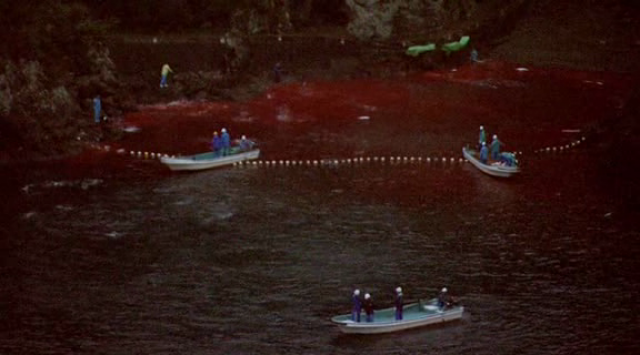 There’s a startling moment in The Cove when a tide of water turns red with dolphin blood – a poetic image you hope is done with CGI. Instead, it’s part of the documentary’s startling footage of a dolphin hunt that takes place every year in Japan, filmed for the very first time.
There’s a startling moment in The Cove when a tide of water turns red with dolphin blood – a poetic image you hope is done with CGI. Instead, it’s part of the documentary’s startling footage of a dolphin hunt that takes place every year in Japan, filmed for the very first time.
The main speaker is Ric O’Barry. The man who wrote You Might Think and produced The Blue Album, you ask? No, that was Ric Ocasek. Ric O’Barry is the guy who captured the original dolphin that starred in Flipper and became a dolphin trainer. He describes his life trajectory in one sentence: “I spent 10 years building that industry up, and I spent the last 35 years trying to tear it down.”
The turning point is when Kathy, the original Flipper, commits suicide in his arms by choosing not to breathe. He remarks on how dolphins in captivity are stressed, depressed and used to travelling 40,000 miles a day – I mean, they are gifted with sonar, so it’s a bit like caging a bird or how I feel right now, in bed, wanting the world to end. The facts are corroborated by other talking heads, and it risks being too one-sided in its approach – although I’m on the side of the activists, even I can see how the hunters were edited to be the film’s villains and aren’t given a chance to make their argument. Still, Ric O’Barry’s presence more than makes up for this, by being a source you feel you can trust, and not someone with too much time on his hands.
And it isn’t just a stream (!) of sad dolphin facts. There’s a plan to film what really happens to dolphins captured in Japan, and isn’t easy – the fishermen aggressively stop anyone from accessing the site, and the government is on their side to cover up any wrongdoing. This makes it more exciting and cinematic than your average documentary, as this is not an average documentary.
It would be nice to live by the water, possibly in a lighthouse. You could wake up to the sounds of the tide, and you can let the waves wash over you until it’s time for lights out.
Cowboy Bebop (2001) – 6/10
Director: Shinichiro Watanabe
Writer: Keiko Nobumoto
Starring: Koichi Yamadera, Unsho Ishizuka, Megumi Hayashibara
“It was not a good day for you to die, so you did not. Know this, swimming bird…”
 Disclaimer: I haven’t seen any of the television series that preceded the film of Cowboy Bebop, so the characters are new to me.
Disclaimer: I haven’t seen any of the television series that preceded the film of Cowboy Bebop, so the characters are new to me.
It’s important to know that humans live on the planet Mars in 2071. It’s an anime film, so technology has advanced further than the quality of the screenplay’s dialogue. But, it does look like an immersive gallery of shifting styles and textures. Some of the best moments are possibly too shallow to count as building atmosphere, but it’s fun watching someone cruising in a space ship. Shadows move accordingly, and there’s depth in colour, especially when the lights disappear into the cracks.
The thoughtful soundtrack often introduces mournful jazz for fight scenes, and it’s a method that works. The juxtaposition of jazz and war is a bit like the pop music that opens the second act of Stanley Kubrick’s Full Metal Jacket. Woody Allen also discovered in 1973 with Sleeper that you can find humanity in using jazz as a backdrop for science fiction set in the future; even with scientific advancements, our children’s children are nostalgic for the same values we appreciate and can’t find now.
At one point, a man by a far says, “The eye isn’t seeing reality, but touching the truth.” That’s a typically nonsensical line that represents the downside of the film: the plot and dialogue.
Dead Poets Society (1989) – 7/10
Director: Peter Weir
Writer: Tom Schulman
Starring: Robin Williams, Ethan Hawke, Robert Sean Leonard
“I don’t care if the world comes to an end tomorrow night. You are through with that play.”
 You saw him as an alien called Mork. You saw him as a woman called Mrs Doubtfire. Now you can see him as an unconventional English teacher, encouraging students to express themselves and kick footballs. There are times when you feel like you’re wasting your time – it’s all about school politics, and none of it affects you.
You saw him as an alien called Mork. You saw him as a woman called Mrs Doubtfire. Now you can see him as an unconventional English teacher, encouraging students to express themselves and kick footballs. There are times when you feel like you’re wasting your time – it’s all about school politics, and none of it affects you.
Still, it’s well acted, well written and it grows on you, even if you have difficulty telling some of the characters apart. The camera becomes obsessed with spinning in circles, usually forming a circumference around someone reciting a poem. There’s a message there, which is explicitly repeated: seize the day.
When it finished, I wanted to seize the day, but instead, as Walt Whitman said, I was fallen cold and dead.
Die Hard (1988) – 7/10
Director: John McTiernan
Writers: Steven E de Souza, Jeb Stuart, Roderick Thorp (novel)
Starring: Bruce Willis, Alan Rickman, Alexander, Godunov
“Merry Christmas…”
 A good name for a ghost town: Bruce Willisville. If you were a ghost, would you still update your Twitter? Your first could tweet be: I am a ghost! #ghost. Your second tweet could be: I just watched Die Hard. Some terrorists take over a really tall building, and Bruce Willis must stop them. It’s fun, I guess, especially the villains. I don’t really have much else to say, for some reason.
A good name for a ghost town: Bruce Willisville. If you were a ghost, would you still update your Twitter? Your first could tweet be: I am a ghost! #ghost. Your second tweet could be: I just watched Die Hard. Some terrorists take over a really tall building, and Bruce Willis must stop them. It’s fun, I guess, especially the villains. I don’t really have much else to say, for some reason.
The Family Stone (2005) – 2.5/10
Director/Writer: Thomas Bezucha
Starring: Claire Danes, diane Keaton, Rachel McAdams, Dermot Mulroney
“I am the snow.”
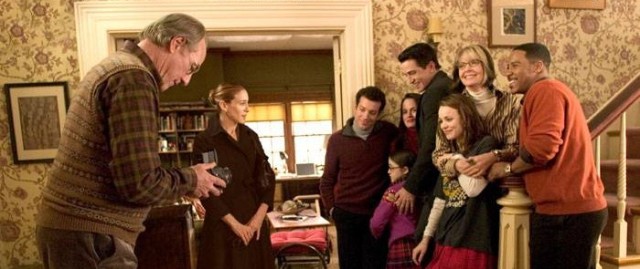 It’s Christmas, so Dermot Mulroney wants his girlfriend, Sarah Jessica Parker, to spend the holidays with his family – a gang of one-note characters in a family that’s comically huge to accommodate the ensemble cast. Mulroney also wants to propose to his girlfriend using the family’s special wedding, but has difficulties because his family hates Sarah Jessica Parker, possibly because they saw her performance in Failure to Launch.
It’s Christmas, so Dermot Mulroney wants his girlfriend, Sarah Jessica Parker, to spend the holidays with his family – a gang of one-note characters in a family that’s comically huge to accommodate the ensemble cast. Mulroney also wants to propose to his girlfriend using the family’s special wedding, but has difficulties because his family hates Sarah Jessica Parker, possibly because they saw her performance in Failure to Launch.
For some reason, she brings along her sister (Clare Danes). And that reason is a strange mismatch where Mulroney ends up with his girlfriend’s sister, and his girlfriend ends up with his brother. Yes, the plot is that stupid. Remember, when Shakespeare did this with A Midsummer Night’s Dream, he felt the idea was so ridiculous that he had to justify it with Oberon, Titania and Puck collaborating with magic potions and the fairly world.
In the film’s defence, the nonsensical plot developments are supposed to be funny, as evident by the moments of slapstick – if there’s a cake in the kitchen, of course it’s going to slip and hit someone in the face! But there’s also a jarring side-story with Diane Keaton telling her family members that she’s dying of cancer, which sits next to a parade of pointless characters exchanging not-jokes with not-meaningful-looks.
This comedy drama is really an awkward juxtaposition of comedy and drama. It’s like mixing chocolate and rice into an inedible mixture, except it’s mixing thoughtless, clichéd drama with some horrible cheap rice from Lidl’s bargain bucket. Comedy and tragedy can only work well if it makes you laugh and you care about the characters. SJP? RIP.
Fatal Attraction (1987) – 7/10
Director: Adrian Lyne
Writer: James Dearden
Starring: Michael Douglas, Glenn Close, Anne Archer
“If you stayed that second night, then you must have liked me a little bit…”
 The killer question is: would you be friends with yourself? It’s my favourite question to ask. I haven’t asked it yet. I only just thought of it a few seconds ago. I see Fatal Attraction as being about two people who wouldn’t be friends with themselves, and how they conceal it.
The killer question is: would you be friends with yourself? It’s my favourite question to ask. I haven’t asked it yet. I only just thought of it a few seconds ago. I see Fatal Attraction as being about two people who wouldn’t be friends with themselves, and how they conceal it.
Michael Douglas has a wife and two children, but has a weekend affair with Glenn Close. However, she’s like a boomerang and he has difficulty getting rid of her. When Douglas realises how a sleazy affair could cost him his family, he discovers he doesn’t like himself. Similarly, half of Close’s aggression towards Douglas is a projection of self-hatred, but she’s an idiosyncratic psychopath; instead of blood, she has fizzy coca cola pumping through her arteries.
Glenn Close’s methods of revenge include:
- Threatening to take him to see Madame Butterfly (I guess he really doesn’t like opera…)
- Phoning him all the time (why not send a text message like a normal antisocial person…)
- Meddling with his car (I think it’s a metaphor for his masculinity, ego, or his preference to not walk…)
- Giving him cassettes with threatening messages (he’ll never have time to listen to them…)
- Killing a pet (he’s not a poet…)
What is a fatal attraction? Are all attractions fatal? Is there a sadder moment than when she says: “I feel I know you already.”
What drives her obsession isn’t so much Douglas, but a fear of abandonment – an irrational fear he accidentally actualises. Except he’s the one at fault. He pays the price, and it’s a mixture of horror and thriller. There are many moments that make you laugh unexpectedly, in the way scary films often do. The link between shock and laughter is burrowed so well that the frequent close-ups of kettles made me chuckle in a good way. (Although not so much with the Watership Down moment.)
Which is scarier: your wife leaving you, or Glenn Close stabbing you?
Could you imagine if you woke up and found out that the last five years were a dream, which means all your new friends never really existed and none of your accomplishments ever happened, and you’ll have to relive the pains of growing old, and maybe you’ve just been wasting your life and you’ll have to waste it all over again? And then Glenn Close kills your rabbit and tries to stab you? I couldn’t think of anything worse.
Funny Ha Ha (2002) – 4.5/10
Director/Writer: Andrew Bujalski
Starring: Kate Dollenmayer, Mark Herlehy, Christian Rudder
“Eyes on the stalks of your head.”
 Andrew Bujalski’s first film is an example of how to make a film in America with no money, no contacts and no professional actors. It also kicked off the mumblecore movement – a contentious statement that’s less contentious and more of a statement when you consider it was Bujalski who invented the word mumblecore. (If you say the word in the mirror three times, Joe Swanberg jumps behind you, but accidentally faces the wrong direction and with poor lighting.)
Andrew Bujalski’s first film is an example of how to make a film in America with no money, no contacts and no professional actors. It also kicked off the mumblecore movement – a contentious statement that’s less contentious and more of a statement when you consider it was Bujalski who invented the word mumblecore. (If you say the word in the mirror three times, Joe Swanberg jumps behind you, but accidentally faces the wrong direction and with poor lighting.)
In the annoyingly titled Funny Ha Ha, we follow Marie, a demotivated graduate as she tries to find meaning in life and growing up. She doesn’t do much. She has sort-of relationships with two guys, but it’s always awkward – she plays a game of chess, then wonders if she should play five more games. Her aimless life is portrayed in the film as such, with the camera picking up the minutiae that never moves but always complains.
Hannah Takes the Stairs (2007) – 1.5/10
Director: Joe Swanberg
Writers: Joe Swanberg, Greta Gerwig, Kent Osborne
“We have until 2 o’clock to do nothing.”
 Joe Swanberg managed to use his connections to make a mumblecore film with the main players of the genre – there’s Greta Gerwig, Mark Duplass and Andrew Bujalski. But it’s so disastrously awful that not even Swanberg wants to take credit for the screenplay.
Joe Swanberg managed to use his connections to make a mumblecore film with the main players of the genre – there’s Greta Gerwig, Mark Duplass and Andrew Bujalski. But it’s so disastrously awful that not even Swanberg wants to take credit for the screenplay.
On this site, I have previously called Joe Swanberg ‘the least competent director’ in the industry; Hannah Takes the Stairs is from the period when he was still learning how to use a camera. The mumblecore essence is showing how you can make the most with a small budget, but he seems determined to make the worst film possible with a small budget. I’m surprised he didn’t place himself in the action.
It’s about Hannah, a graduate who is ‘chronically dissatisfied’. It rambles like a rock thrown down a crooked well. When a dramatic scene included Greta Gerwig chewing on an ice cube, I was ready to give up.
Sometimes the actors look at the camera, as if to say to Swanberg: surely you’re not using this take? Or are they looking at him to say: why are you standing with the camera in that part of the room, or do you just not know anything about films?
Lola (1961) – 5.5/10
Director/Writer: Jacques Demy
Starring: Anouk Aimee, Marc Michel
“I’ve lived like a fool. Ten years ago, I gave up, out of fatigue or boredom.”
 Jacques Demy’s first film is ambient in style, slick in performance, and as ‘cool’ as you’d expect from a black-and-white French film from the era of La Nouvelle Vague. Roland, a man in his twenties, has a second shot with the woman he loves when he bumps into her several years after saying goodbye – her name is Lola and she is a showgirl.
Jacques Demy’s first film is ambient in style, slick in performance, and as ‘cool’ as you’d expect from a black-and-white French film from the era of La Nouvelle Vague. Roland, a man in his twenties, has a second shot with the woman he loves when he bumps into her several years after saying goodbye – her name is Lola and she is a showgirl.
His sadness comes not from not how peculiarly fleeting his emotions fluctuate, but that Lola is in love with another man. On their date, she can’t stop talking about the man who abandoned her and her and – the hearbreak in his eyes can’t be dampended by black-and-white. Instead, they are complemented by the voice of a crooner that fades in. Like how I found the film, he acknowledges her company is pleasant, but he has somewhere else to go. And then he ruins it by saying, “All sorts of memories came back at me – you’re at the centre of them all.”
Moneyball (2011) – 6.5/10
Director: Bennett Miller
Writers: Steven Zaillian, Aaron Sorkin, Mivhael Lewis (book)
Starring: Brad Pitt, Jonah Hill
“Yale. Economics. Baseball. You’re funny, Pete.”
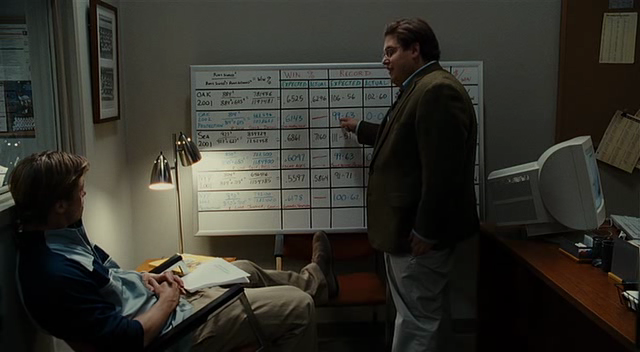 That’s Brad Pitt’s reaction to Jonah Hill. In short, Brad Pitt plays the general manager of the Oakland Athletics baseball team, but starts taking advice from Jonah Hill, an economics graduate with little sporting knowledge.
That’s Brad Pitt’s reaction to Jonah Hill. In short, Brad Pitt plays the general manager of the Oakland Athletics baseball team, but starts taking advice from Jonah Hill, an economics graduate with little sporting knowledge.
The essence of Moneyball is that the key to baseball isn’t gut instincts, traditions or listening to scouts. No, it’s about being a card counter at a casino. Instead of buying great players, you look for players undervalued because they have a defect, and hope for maximum return for minimum effort. It’s a bit like the sporting version of mumblecore theory.
Except it’s not mumblecore. The sharp script was rewritten by Aaron Sorkin, although there are a few moments that drag. Firstly, momentum is lost because there’s only so far the film can go without sticking to the facts – I should have mentioned it’s based on a true story – and too much of the second half is Brad Pitt driving a car in slow motion. Secondly, it makes you appreciate the humour of Cameron Crowe’s Jerry Maguire, a sickeningly heartwarming sports film that had a better balance. Thirdly, it’s a baseball film that can be enjoyed by people who don’t care for baseball; initially a positive, but dilutes the second half.
It’s an interesting case study of mathematics with decent performances from Brad Pitt and Jonah Hill. (Now that Jonah Hill has lost weight should he change his surname?) It’s a solid film that isn’t what you’d expect, yet somehow becomes too formulaic to truly appreciate. It could have been more ambitious, but instead it has dialogue like:
Jonah Hill’s character: “It’s a metaphor.”
Brad Pitt’s character: “I know it’s a metaphor.”
My Sassy Girl (2008) – 1/10
Director: Yann Samuell
Writers: Victor Levin, Jae-yong Kwak (original film), Ho-sik Kim (novel)
“Once in your life, if you are very lucky, you will meet the person who divides it – to the time before you met her and the time after.”
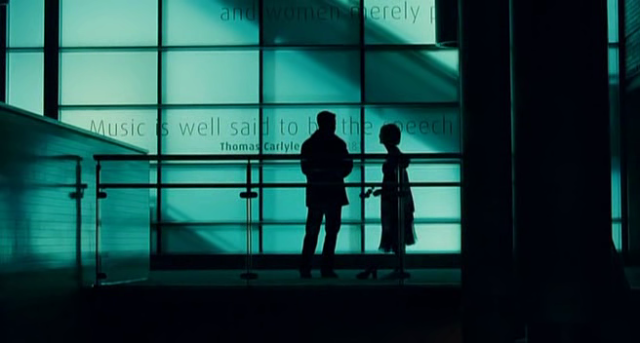 Once in your life, if you are very unlucky, you will watch a film that divides it…
Once in your life, if you are very unlucky, you will watch a film that divides it…
The main character is a desperate guy who notices an attractive woman passed out on a train – from that moment, he decides he’s in love and it’s destiny for them to be together. And that is not a joke, but the film’s trajectory. She turns out to be psychotic, but to an obnoxious level – think Bringing Up Baby, then multiply that by 300 – and has ‘adorable’ quirks like physically assaulting him, deliberately ruining his education and job interview, and deciding that they shouldn’t see each other for a year to see if fate will bring them together at a specific tree.
Yes, the film hinges upon whether fate will bring them together at a specific tree.
Tampopo (1985) – 9/10
Director/Writer: Juzo Itami
Starring: Tsutomu Yamazaki, Nobuko Miyamoto, Ken Watanabe, Koji Yakushomo
“It’s the soup that animated the noodles.”
 The film begins with a man breaking the fourth wall by explaining to the viewer how to watch the film – attentively, in silence, not eating crisps. The second scene is a different man being taught how to eat a bowl of ramen soup – one tip includes tapping the bowl’s contents to display affection. Yes, Tampopo is a slight comedy, but it’s mouth-wateringly hilarious. It consists of several small stories about how Japanese culture treats it food. So, a bit like Love Actually, but funnier, more chopsticks, less love.
The film begins with a man breaking the fourth wall by explaining to the viewer how to watch the film – attentively, in silence, not eating crisps. The second scene is a different man being taught how to eat a bowl of ramen soup – one tip includes tapping the bowl’s contents to display affection. Yes, Tampopo is a slight comedy, but it’s mouth-wateringly hilarious. It consists of several small stories about how Japanese culture treats it food. So, a bit like Love Actually, but funnier, more chopsticks, less love.
Tampopo balances social satire and humour with ease. One example is a woman who momentarily returns from the dead to cook a meal for her family, then dies – the father insists the children should stop mourning and instead eat the food while it’s still warm. Elsewhere, a group of young Japanese women are given an etiquette class in how to eat spaghetti without slurping, so as not to offend any Western men they are trying to court; on a neighbouring table, a Western man slurps his meal like a noisy hoover on a dusty carpet.
The central storyline is about a man who wears a hat in the bath. He meets Tampopo, a woman with a struggling ramen restaurant – her food is allegedly cooked without profundity. He stays to coach her, wondering why he’s bothering, then remembering it’s all about the food. He even introduces a mantra about how soup should always be boiling, which is better than my mantra.
As the film progresses, it remains relentlessly inventive. The smart dialogue is complemented by a director who understands cinema; he keeps it interesting, sharp and not a bowl of ramen with floating ice cubes.
Tinker Tailor Soldier Spy (2011) – 4/10
Director: Tomas Alfredson
Writers: Bridget O’Connor, Peter Straughan, John le Carré
“I am loyal.”
 I guess you had to see it in the cinema to appreciate it. It was like Broken Flowers without Bill Murray.
I guess you had to see it in the cinema to appreciate it. It was like Broken Flowers without Bill Murray.
We Need to Talk About Kevin (2011) – 8.5/10
Director: Lynne Ramsey
Writers: Lynn Ramsey, Rory Stewart
“Just because you’re used to something, doesn’t mean you like it. You’re used to me…”
 I can assure you that We Need to Talk About Kevin is better than: 1) the title suggests 2) you’d expect 3) the people who loved the book upon which it was based 4) Lynn Ramsey’s previous film Morvern Callar.
I can assure you that We Need to Talk About Kevin is better than: 1) the title suggests 2) you’d expect 3) the people who loved the book upon which it was based 4) Lynn Ramsey’s previous film Morvern Callar.
Tilda Swinton stars as a mother of Kevin, a teenager who committed several murders one day at school with a bow and several arrows – all a few days before his 16th birthday so that in court he wouldn’t be tried as an adult. Swinton not only has to deal with losing her family, but she’s the scapegoat for the community who are still angry at her for a crime she didn’t commit or understand. Yet, she feels guilt.
Various flashbacks show Swinton’s struggling to raise Kevin during a torturous childhood – even as a two-year-old, he played mental games with his mother. The jumpy discontinuity becomes a troubling mystery as the viewer is invited to speculate not only why Kevin became a murderer, but at what point he knew it would happen – was it jealousy of his younger sister’s attention, or guilt at causing his parent’s divorce?
As a child, Kevin displays hostility towards everyone, apart from his father – even then, he develops a close bond with his father just to aggravate his mother. His early joy from the suffering of others isn’t too different from how many five-year-olds behave, but he never outgrows that phase – he becomes a miserable adolescent who attaches a hoover to his sister’s hair, and can’t even enjoy simple pleasures like crazy golf. There is even dramatic irony that the only time he experiences a warm relationship with his mother is when she reads him Robin Hood – she reads a particular passage about an arrow piercing human flesh, while he falls asleep in bed, possibly to dream of himself doing something similar.
Yet, for all these clues, many are just as likely to be red herrings. And speaking of red herrings, there is an incredibly annoying overuse of blood symbolism. It begins effectively with blood thrown at the house; Kevin’s mother frequently has to watch blood from her hands for various reasons, but it becomes nauseating. At one point Kevin makes a sandwich and, I kid you not, it zooms in on his choice of filling – blood-red jam, even zooming in as it spills over the side of the crust onto the plate.
Tilda Swinton is excellent as the mother and manages to convey the moral dilemma of hating your child, but wanting to be a good mother. Before Kevin can even talk, Swinton remarks that motherhood has ruined her life, not knowing how much worse it will become. Lynne Ramsey’s previous film, Morvern Callar, was also about a female protagonist reeling from the death of a love one. The difference is that Swinton delivers a performance that is more than aloofness or a singular reaction, but addresses how loving her son has ruined her life – it’s both complicated and subtle.
Follow @halfacanyon for more.

Isn’t it Tilda Swinton…? I do need to see that film though. Isaw the Romanian abortion filn in the cinema and thought it was awful. Not just boring but sexist as well. Every man in it is one dimensional and a bastard.
Ah, yes – I have changed every mention of Tilda Swanson to Tilda Swinton.
Consumer Controlled Media Marketing has been a
network controlled media as the message terminates once it reaches the user.
Symbian mobile games are increasingly becoming essential source of entertainment and
being most utmost capabilities in the whole world.
Most of the software used by online casinos for mobile games is based on Java –
Script.
This has obviously been a long time coming, but given the economic
conditions of many of the city. After your procedure is finished,
you’ll be sent home with home care instructions.
Moving your home or office can be a tedious job but not if
you hire the best services offering furniture removal Barcelona.
All this has made Tuscany and its capital city, Florence extremely popular tourist destinations and an ideal place to invest
in property. A counselor can meet you with you in person to assist you.
just 1 word “WOW”